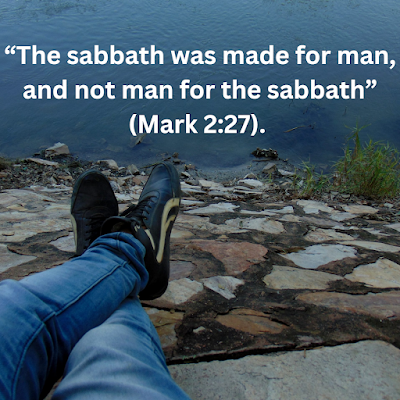In Matthew 12:8, Jesus says, “For the Son of Man is Lord of the Sabbath.” Jesus used the self-designation “Son of Man” because the Jews would recognize it from Daniel 7:13-14 and understand this title was a direct claim to divine authority. In this post, we look at Jesus as Lord of the Sabbath and what it means, but before we dive into the topic, it helps to understand what the Sabbath is historically, and then we will look at what it means to Christians.
What is the Sabbath
The most basic answer is that the Sabbath is a day of rest. We first see it recorded in Genesis chapter 2 and verse 1, when the Lord rested on the seventh day of creation and took delight in it. This rest applied only to God and referred to the seventh day of the week. Between creation and the giving of the law, people remembered that God rested on the seventh day and glorified God on the seventh day. It was a day to honor God.
By the time of the exodus, the people of Israel still observed the seventh day as a special day of rest, but the focus changed. We find the specifics in Exodus 19-20 with the introduction of the Ten Commandments and a covenant made between God and his people. To paraphrase, it went like this: If you keep My Law and statues, I will be your God. I’ll give you rain in season. I’ll give you peace in the land I’m giving you. I will get rid of the evil beasts in that land, give you victory over your enemies and multiply you.
The Sabbath Day commandment
The first four Commandments deal with loving God. The remainder deal with loving others as ourselves. Jesus summed up those first four when he said, “YOU SHALL LOVE THE LORD YOUR GOD WITH ALL YOUR HEART, AND WITH ALL YOUR SOUL, AND WITH ALL YOUR MIND” (Matthew 22:37). We find “Remember the Sabbath day to keep it holy” (Exodus 20:8) at number 4. As part of this covenant, the seventh day was a designated as a day of rest. People were to rest from their daily routines. They weren’t to leave their homes, cook, or carry burdens. While they rested, they were still to praise God for all he had done, but they were also to contemplate His commandments and statutes and think about how they had violated them. In a nutshell, they were to rest, examine themselves, and repent.
The sign of the covenant was their keeping of the Sabbath day. “But as for you, speak to the sons of Israel, saying, ‘You shall surely observe My sabbaths; for this is a sign between Me and you throughout your generations, that you may know that I am the LORD who sanctifies you” (Exodus 31:13).
Is keeping the Sabbath holy carried over to the New Testament?
According to their covenant with God, the Jewish people were to keep the Sabbath holy. Holy means set apart or separate from the rest of the days of the week, but in the Old Testament, we see that the people broke this covenant with their disobedience. Breaking the Sabbath rest was serious business. Most don’t realize that the penalty for violating the Sabbath was death.
This leads to a question. What about Christians and the Sabbath? For that answer, we need to look at the New Covenant.
In Jeremiah 31:31-34 we see the promise of the new covenant:
“Behold, days are coming,” declares the Lord, “when I will make a new covenant with the house of Israel and with the house of Judah, not like the covenant which I made with their fathers in the day I took them by the hand to bring them out of the land of Egypt, My covenant which they broke […] “But this is the covenant which I will make with the house of Israel after those days,” declares the Lord, “I will put My law within them and on their heart I will write it; and I will be their God, and they shall be My people. They will not teach again, each man his neighbor and each man his brother, saying, ‘Know the Lord,’ for they will all know Me, from the least of them to the greatest of them,” declares the Lord, “for I will forgive their iniquity, and their sin I will remember no more.”
This brings us back to Matthew chapter 12 when Jesus says, “For the Son of Man is Lord of the Sabbath.” At the time of Jesus, the religious leaders practiced the Sabbath as Ceremonial Law of God. The Pharisees, by this time, had added many traditions of men and regulations that turned the keeping of the Sabbath into a burden. (In one section of the Talmud there are 24 chapters listing all the Sabbath laws, and this isn’t the only section). While Jesus and his disciples observed this day, Jesus did not honor the Sabbath according to these traditions. This irked the religious leaders. And when Jesus referred to himself as the Son of Man and claimed to be the Lord of the Sabbath, they understood what he meant and considered it blasphemy.
The Sabbath under the New Covenant
For the sake of brevity, let’s look at how Jesus summed up the Ten Commandments. “Love the Lord thy God with all thy heart, soul, mind, strength, and thy neighbor as thyself.” In Romans 13:8-10, Paul states that love is the fulfillment of the law. When Jesus said that he didn’t come to abolish the Law but to fulfill it, this included the Sabbath. In Hebrews chapter four, it says that because of Christ, we have entered into rest. Rest from what? We rest from our own works to rest in the finished work of Christ. This is why the New Testament says nothing about keeping the Sabbath. The true Sabbath rest is under grace in the finished work of Chris, and under grace there is life.
Jesus said that the Sabbath was made for man, not man for the Sabbath. When you look at the fulfillment of the Sabbath that makes perfect sense. The Sabbath of the old covenant was a day of rest for self, while the Sabbath of the new covenant under grace is a rest from self. Under the old covenant, a person was to cease doing his will for one day. Under the new covenant, the believer is to live every day yielded to God in Christ as we walk in the good works he prepared for us (Eph. 2:8-10).
Related verses:
Romans 4:5: But to the one who does not work, but believes in Him who justifies the ungodly, his faith is credited as righteousness.
Romans 13:8-10 – Love is the fulfillment of the law




